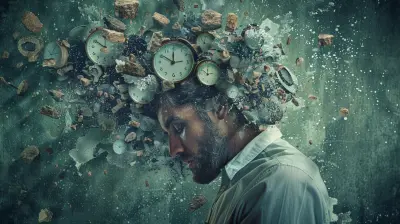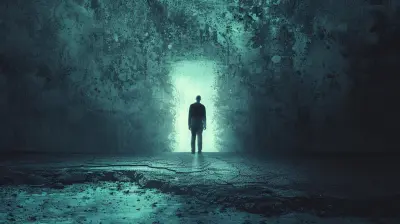How to Recognize Early Warning Signs of Depression
10 March 2025
Depression is a bit like an unwelcome guest that creeps in without a formal invitation. It starts by subtly knocking on the door of your mind and, before you know it, it's moved in, rearranging your thoughts and emotions. Many people don’t even realize they’re living with depression until it has already taken a firm grip. That’s because depression doesn’t always show up with an obvious “Hey, I'm here!” Instead, it often whispers and hides behind everyday struggles.
So, how can you recognize the early warning signs of depression? Let’s chat about this tricky, invisible foe and learn how to spot its early moves before it fully settles in.

What Is Depression?
Before diving into the warning signs, let's take a step back and talk about what depression actually is. Sure, everyone feels sad or blue from time to time. Life throws curveballs, and sometimes we’re just not in the mood to deal with it all. But depression is more than just feeling sad. It’s a persistent, overwhelming gloom that doesn’t go away with a good night's sleep or a fun weekend.Depression is a mental health condition that affects how you think, feel, and behave. It can cloud your judgment, zap your energy, and even make getting out of bed feel like climbing a mountain. The tricky part? Depression doesn’t always scream for attention. Sometimes, it hides behind little behaviors or thoughts we don’t recognize as problematic—at least, not at first.

Why Recognizing Early Signs Is So Important
Imagine trying to stop a rolling boulder halfway down a hill. Almost impossible, right? But if you catch it at the top, you have a much better chance of stopping it. That’s why catching the early signs of depression is crucial. The earlier you identify and address it, the easier it can be to manage.It’s not just about feeling better faster, either. Depression has a sneaky way of affecting all areas of life—work, relationships, even physical health. By recognizing the early signs, you can avoid the snowball effect and seek help before it spirals out of control.

Early Warning Signs of Depression
Let’s get into the meat of the matter. What are the early signs you should be looking for? Remember, depression can look different for everyone, but these common warning signs can give you a good starting point to recognize if something’s not right.1. Persistent Sadness or Low Mood
Sure, everyone has bad days. But if you find yourself feeling down, sad, or hopeless for weeks on end, it’s more than just a rough patch. Depression often feels like a dark cloud that just won’t go away, no matter what you do.You might wake up with a sense of dread or find that things that used to make you happy now feel pointless. It’s like trying to swim through molasses—everything feels heavy, and nothing seems worth the effort.
2. Loss of Interest or Pleasure in Activities
Remember those hobbies you used to love? Whether it was painting, playing sports, or even just hanging out with friends, depression can rob you of the joy you once found in those activities. This is called “anhedonia,” and it’s one of the hallmark signs of depression.It’s not that you just don’t have time for your hobbies anymore; it’s that they don’t bring the same joy or satisfaction. You might even feel indifferent about things that used to make you excited.
3. Changes in Appetite or Weight
When depression starts to take hold, it can mess with your relationship with food. Some people find they lose their appetite entirely or forget to eat. Others might turn to comfort foods and overeat to fill the emotional void. This can lead to noticeable weight fluctuations—either gaining or losing weight more than usual.The key here is recognizing that these changes aren't driven by conscious decisions about diet or health but by an emotional shift that’s out of your control.
4. Sleep Disturbances
Ever find yourself tossing and turning at night, unable to shut off your mind? Or maybe you can’t seem to drag yourself out of bed, no matter how much sleep you get? Depression can play nasty tricks on your sleep patterns.Some people with depression experience insomnia—they can’t fall asleep or stay asleep. Others have the opposite problem: they sleep way more than usual but still feel exhausted. Either way, your sleep patterns change drastically, and you feel like no amount of rest can recharge you.
5. Fatigue or Loss of Energy
Feeling tired is one thing, but depression brings a kind of exhaustion that’s hard to explain. It’s as if life itself has drained your battery, and no matter how many naps you take, you can’t seem to get your energy back.This fatigue is both physical and mental. Simple tasks—like taking a shower or getting dressed—can feel overwhelming. You might even find yourself avoiding social situations or responsibilities because you just don’t have the energy to deal with them.
6. Feelings of Worthlessness or Guilt
Depression has a way of distorting your self-perception. You might start feeling like a failure, even if there’s no real reason to. You might obsess over past mistakes or feel overwhelmingly guilty about things that are out of your control.These feelings of worthlessness can make it hard to believe that anyone cares about you or that your life has any meaning. It’s like you’re stuck in a loop, constantly criticizing yourself and feeling unworthy of happiness.
7. Difficulty Concentrating or Making Decisions
Ever feel like your brain has turned into fog? Depression often makes it hard to focus, remember things, or make decisions. Even small tasks—like deciding what to have for dinner—can feel like monumental challenges.You might find that you’re more forgetful or that you struggle to complete tasks at work or school. It’s not a matter of being distracted; it’s like your brain just isn’t working the way it used to.
8. Irritability or Restlessness
Depression doesn’t always manifest as sadness. For some people, it shows up as irritability or anger. You might find yourself snapping at people for no reason or feeling agitated without really understanding why.This restlessness can also make it hard to relax. Even if you’re physically still, your mind might be racing, constantly worrying or feeling on edge.
9. Physical Symptoms
Believe it or not, depression can show up in your body, too. You might experience unexplained aches and pains, headaches, or digestive issues that don’t seem to have a clear cause. These physical symptoms are real, even if they don’t stem from a medical condition.The mind and body are deeply connected, and when your mental health is suffering, your body often follows suit.
10. Thoughts of Death or Suicide
This is perhaps the most serious warning sign of depression. If you find yourself thinking about death, wishing you weren’t alive, or considering harming yourself, it’s crucial to seek help immediately. These thoughts can be fleeting or persistent, but either way, they signal that your depression has reached a dangerous level.Please remember: If you or someone you know is having suicidal thoughts, don’t wait. Reach out to a mental health professional or a helpline as soon as possible.

When to Seek Help
If any of these signs resonate with you—or if you notice them in someone you care about—it might be time to seek help. Depression is a serious condition, but it’s also treatable. Therapy, medication, lifestyle changes, or a combination of these can make a world of difference.Don’t wait until the boulder is halfway down the hill. If you catch depression early, you can address it before it spirals out of control. And remember, there’s no shame in asking for help. Mental health is just as important as physical health, and seeking treatment is a sign of strength, not weakness.
How to Support Someone Showing Early Signs of Depression
If you notice these signs in a friend or family member, it can be tough to know what to do. Here’s a simple tip: Be there. Listen without judgment, offer support, and encourage them to seek professional help if needed. Sometimes, just knowing someone cares can make all the difference.It’s also helpful to educate yourself about depression, so you can better understand what your loved one is going through. But don’t forget to take care of yourself, too. Supporting someone with depression can be emotionally taxing, so make sure you have your own support system in place.
Final Thoughts
Recognizing the early warning signs of depression can be a game-changer. Whether you’re noticing these signs in yourself or someone else, the key is to act early. Depression may be a stubborn guest, but with the right tools and support, it’s possible to show it the door before it overstays its welcome.If you’re feeling overwhelmed or uncertain, reach out. Whether it’s to a friend, family member, or mental health professional, talking about what you’re experiencing can be the first step toward feeling better.
Remember: You don’t have to go through this alone.
all images in this post were generated using AI tools
Category:
Mental Health AwarenessAuthor:

Eliana Burton
Discussion
rate this article
10 comments
Haven Spencer
This article does a great job of highlighting the subtle signs of depression that often go unnoticed. Recognizing these early indicators is crucial for timely intervention and support. Awareness can truly make a difference.
April 7, 2025 at 3:48 PM

Eliana Burton
Thank you for your kind words! I'm glad you found the article helpful in raising awareness about the importance of recognizing early signs of depression.
Bella Cummings
Thank you for this insightful article!
April 3, 2025 at 3:49 AM

Eliana Burton
You're welcome! I'm glad you found it insightful.
Pamela Middleton
This article offers valuable insights into recognizing early signs of depression. I'm intrigued by how awareness can empower individuals and their loved ones. Understanding these signals might make a significant difference in someone’s mental health journey.
March 25, 2025 at 3:53 PM

Eliana Burton
Thank you for your thoughtful comment! I'm glad you found the insights valuable—awareness is indeed a crucial first step in supporting mental health.
Eleanor Ramirez
Subtle changes in mood and behavior signal depression.
March 24, 2025 at 5:40 PM

Eliana Burton
Absolutely, recognizing subtle changes is crucial for early intervention in depression.
Alvin Conrad
Important insights, thank you!
March 23, 2025 at 5:54 PM

Eliana Burton
Thank you for your feedback! I'm glad you found the insights helpful.
Arden Chavez
Recognizing early warning signs of depression is vital; it invites introspection and connection. Awareness fosters empathy, encouraging us to seek help not just for ourselves, but also to support those silently suffering around us.
March 22, 2025 at 4:01 AM

Eliana Burton
Thank you for your insightful comment! Recognizing early warning signs is indeed crucial for fostering both self-awareness and compassion towards others. Together, we can make a difference.
Niva Sharp
Recognizing early warning signs of depression is crucial; it enables timely intervention, fostering better mental health outcomes and improved well-being.
March 20, 2025 at 5:32 PM

Eliana Burton
Absolutely! Early recognition of depression is vital for effective intervention and can significantly enhance overall mental health and well-being. Thank you for highlighting this important point!
Astrid McKinstry
This article provides essential insights into identifying early signs of depression. Awareness is key; recognizing these symptoms early can lead to timely support and intervention. Great resource!
March 16, 2025 at 5:51 PM

Eliana Burton
Thank you for your kind words! I'm glad you found the article helpful in raising awareness about early signs of depression. Early recognition is indeed crucial for effective support.
Orion McVicker
Feeling like your inner monologue has switched to a drama series? If you’re binge-watching sad thoughts instead of shows, it might be time to hit pause and check for those early warning signs. Your mind deserves a comedy!
March 15, 2025 at 5:06 PM

Eliana Burton
Absolutely! Recognizing those shifts in your inner monologue is crucial. Prioritizing mental health and seeking joy can make all the difference.
Peregrine McVicker
Thank you for sharing this important insight.
March 10, 2025 at 4:41 PM

Eliana Burton
You're welcome! I'm glad you found it helpful.
MORE POSTS

How to Navigate Emotional Triggers with Mindfulness

The Power of Positive Thinking in Managing Stress

How to Help a Child Cope with the Death of a Pet

How to Create a Grief Journal to Process Emotions

The Psychology of Motivation and Procrastination

Mental Health for Men: Breaking Down the Barriers to Seeking Help

Grief and the Holidays: How to Handle Celebrations After Loss